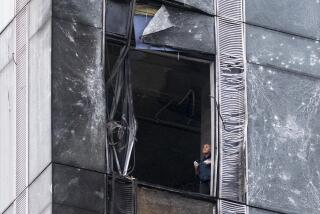Ukraine Missile Radar Work Halted : Soviet Union: Many residents feared the electromagnetic waves from the facility. The move is seen as a defeat for the Defense Ministry.
- Share via
MOSCOW — The Kremlin gave Ukrainian activists a significant victory over the Soviet military Establishment on Monday by ordering construction halted on a ballistic missile early-warning radar in the Carpathians and the mothballing of facilities already built.
Moscow-based Western military attaches had been closely watching the fate of the Mukachevo phased-array radar, under construction since 1985 at a cost of at least 100 million rubles ($172 million), calling it a barometer of how much influence the Soviet Defense Ministry now has in the making of policy.
Hundreds of thousands of residents of the Western Ukraine protested the project, saying that they feared the electromagnetic waves the radar would generate are hazardous. That argument, plus the logic of improved East-West relations and the attention now being given grass-roots sentiments in the Soviet Union, evidently carried the day over the military’s security concerns.
The Council of Ministers, or Cabinet, ordered a halt in construction at Mukachevo and even instructed the Defense Ministry, at its own expense, to recultivate the forests and farmland that were commandeered for the large-scale facility, the official Tass news agency reported.
For the past two years, residents of the Carpathians had protested the radar’s construction, specifically objecting to the radiation risk, a potent argument in the Ukraine, where the Chernobyl nuclear power plant accident occurred four years ago.
In January, regional government authorities joined in the chorus for an end to the Mukachevo project. Residents, however, claimed that the Defense Ministry only speeded up construction, with work proceeding at the site day and night.
At least 800,000 people living in the verdant, mountainous region near the Soviet Union’s western frontier signed petitions against the construction of the missile tracking station. In response to the groundswell of opposition, construction was ordered frozen in April by a government commission headed by Yevgeny Velikhov, a Soviet legislator and the chief scientific adviser to President Mikhail S. Gorbachev.
“Public opinion rightly feared that while in operation, the station would affect surrounding areas with electromagnetic radiation and use large quantities of scarce water,” Tass said. Velikhov said that his commission “could not ignore the opinion of the masters of the land.”
Tass said that Monday’s decision by the Council of Ministers, along with a recent vote by the Ukrainian Parliament to place a five-year moratorium on the construction of powerful radar stations in the republic, “is expected to defuse the situation in the Carpathian area.”
It also shows the attention now being paid to local concerns by Soviet leaders, including in the Ukraine, whose legislature recently proclaimed the republic “sovereign.” Although state-run television said Monday night that Ukrainian lawmakers are not in favor of secession from the Soviet Union, shutting down the radar project will show residents that Moscow is ready to heed their wishes.
The Council of Ministers’ decision, however, will not satisfy everyone since, as reported by Tass, it stipulates that “installations already in place (at Mukachevo) will be mothballed,” rather than dismantled outright, as many activists had wanted.
In October, Eduard A. Shevardnadze, the Soviet foreign minister, acknowledged that his government had violated the Anti-Ballistic Missile Treaty by building a large phased-array radar near the Siberian city of Krasnoyarsk that, according to Western experts, was similar to the one under construction in the Carpathians.
“The size of an Egyptian pyramid,” as Shevardnadze put it, the Krasnoyarsk radar violated the ABM pact because it was located far from the borders of the Soviet Union, unlike the site at Mukachevo.
More to Read
Sign up for Essential California
The most important California stories and recommendations in your inbox every morning.
You may occasionally receive promotional content from the Los Angeles Times.













